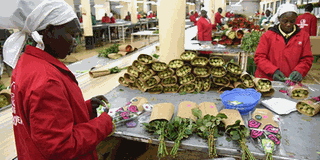Breaking News: At least 10 feared to have drowned in Makueni river
It’s triple work for flower farm workers

Workers at Equator Flowers Farm in Eldoret, Uasin Gishu County pack flowers for export on March 16, 2020. The flower business has been greatly affected by Covid-19 forcing them to reduce workforce by 50 per cent. PHOTO | JARED NYATAYA | NATION MEDIA GROUP
What you need to know:
- Flower farms retained a lean staff after relieving 50 per cent of their permanent workforce
- Women constitute 65 to 75 per cent of the workforce
- In one farm, the workforce was reduced to four from 10
- Survey shows 65 per cent of women interviewed head households of two to three children and a host of other relatives.
The flower sector is one of the hardest hit by Covid-19, leaving female employees with doubled or tripled workload, heavily affecting their physical and mental health.
Flower farms retained a lean staff after relieving 50 per cent of their permanent workforce and sacking all casuals. Women are estimated to constitute 65 to 75 per cent of the workforce in floriculture sector, thus their higher retention.
A Hivos survey on Impact of Covid-19 on Women Workers in the Horticulture Sector in Kenya paints a picture of overworked women struggling to keep a balance between work and family work life.
HEAVY WORKLOAD
The 71 women workers assessed in the April survey reports of rise in sick-offs due to high levels of fatigue and stress as their workload had either doubled or tripled on a half-pay.
“I feel tormented both mentally and physically. It is like life has turned upside down. I am doing more than double the work I used to do. And yet when I get back home, my children need my full attention,” one of the women workers is quoted in the report.
The heavy workload relates to uprooting and disposing the flowers that had been planted in vast pieces of land prior to the outbreak of the deadly disease. They also had to simultaneously respond to the few orders made, indicate the women.
In one farm, for instance, the workforce was reduced to four from 10, nearly tripling the workload. While in another, only two workers were retained out of the seven attached to one greenhouse.
On March 19, Kenya Flower Council(KFC) Chief Executive officer Mr Clement Tulezi told journalists in Nairobi that the flower sector was losing Sh20 million daily due to Covid-19 outbreak.
FINANCIAL STRAIN
He indicated that the value of the industry which stood at Sh120 billion in 2019, was likely to drop to half its value if the slowdown in the business persisted for more five to six weeks. And this would result to laying off large percentage of permanent workers.
In Hivos’ survey, 65 per cent of the women interviewed headed households of two to three children and a host of other relatives.
“Many of them endure the financial strain brought about by extra obligations because they live not only with their own children, but also with in-laws, nephews, nieces and grandchildren,” notes the report.
About 60 per cent of the women interviewed earned below Sh10,000, little to sustain a family of four and cover extra expenses such as healthcare and education.
Those with a pay ranging from Sh10,000 to Sh14,000 are mainly long serving workers or in supervisory positions, according to the report.
“It is little wonder, therefore, that all the respondents live in informal settlements such as Karagita in Naivasha and Mugumoini in Thika. The cost of single rooms in these areas ranges between Sh1,500 and Sh2,000, while double rooms go for about Sh2,500 and Sh3,000,” the researchers state in the report.
EXTRA BUSES
Their stress levels were further accelerated by increased burden of care as women reported of their spouses relegating their domestic responsibilities.
They women had taken up home-schooling roles “besides their hectic schedules of balancing between domestic chores and the heavy workloads in the companies.”
The flower farms management, however, introduced employee welfare packages to facilitate smooth running of their operations.
Some hired extra buses to accommodate their workers as they observed social distancing and introduced variety of breeds for new markets, thus maintaining a revenue stream.
Others introduced night shifts for their pack house workers and expanded the grading area to accommodate all the workers to observe social distancing.
The survey drew the 71 women workers from 12 flower farms in Nairobi, Rift Valley and Mt Kenya regions.





